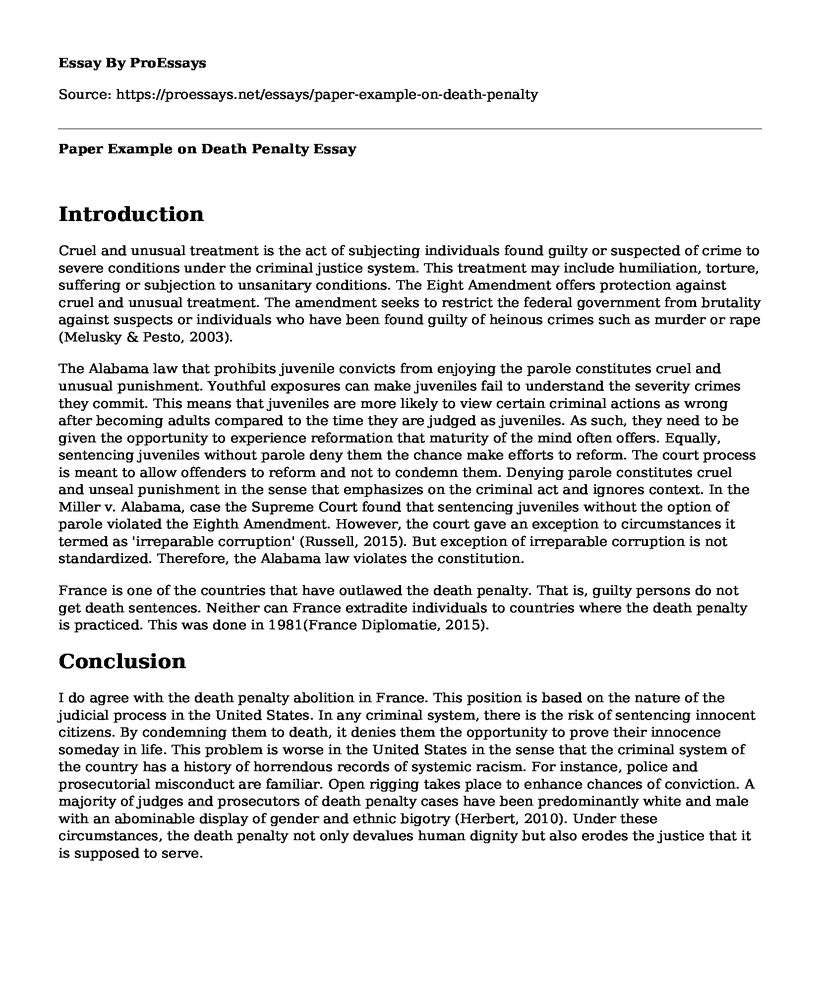Introduction
Cruel and unusual treatment is the act of subjecting individuals found guilty or suspected of crime to severe conditions under the criminal justice system. This treatment may include humiliation, torture, suffering or subjection to unsanitary conditions. The Eight Amendment offers protection against cruel and unusual treatment. The amendment seeks to restrict the federal government from brutality against suspects or individuals who have been found guilty of heinous crimes such as murder or rape (Melusky & Pesto, 2003).
The Alabama law that prohibits juvenile convicts from enjoying the parole constitutes cruel and unusual punishment. Youthful exposures can make juveniles fail to understand the severity crimes they commit. This means that juveniles are more likely to view certain criminal actions as wrong after becoming adults compared to the time they are judged as juveniles. As such, they need to be given the opportunity to experience reformation that maturity of the mind often offers. Equally, sentencing juveniles without parole deny them the chance make efforts to reform. The court process is meant to allow offenders to reform and not to condemn them. Denying parole constitutes cruel and unseal punishment in the sense that emphasizes on the criminal act and ignores context. In the Miller v. Alabama, case the Supreme Court found that sentencing juveniles without the option of parole violated the Eighth Amendment. However, the court gave an exception to circumstances it termed as 'irreparable corruption' (Russell, 2015). But exception of irreparable corruption is not standardized. Therefore, the Alabama law violates the constitution.
France is one of the countries that have outlawed the death penalty. That is, guilty persons do not get death sentences. Neither can France extradite individuals to countries where the death penalty is practiced. This was done in 1981(France Diplomatie, 2015).
Conclusion
I do agree with the death penalty abolition in France. This position is based on the nature of the judicial process in the United States. In any criminal system, there is the risk of sentencing innocent citizens. By condemning them to death, it denies them the opportunity to prove their innocence someday in life. This problem is worse in the United States in the sense that the criminal system of the country has a history of horrendous records of systemic racism. For instance, police and prosecutorial misconduct are familiar. Open rigging takes place to enhance chances of conviction. A majority of judges and prosecutors of death penalty cases have been predominantly white and male with an abominable display of gender and ethnic bigotry (Herbert, 2010). Under these circumstances, the death penalty not only devalues human dignity but also erodes the justice that it is supposed to serve.
References
France Diplomatie. (2015). Erreur - France-Diplomatie - Ministere de l'Europe et des Affaires etrangeres. Retrieved from https://www.diplomatie.gouv.fr/en/french-foreign-policy/human-rights/death-penalty/france-and-death-penalty/
Herbert, B. (2010). The death penalty should be abolished. The Seattle Times [Washington].
Melusky, J. A., & Pesto, K. A. (2003). Cruel and unusual punishment: Rights and liberties under the law. Santa Barbara, CA: ABC-CLIO, Inc.
Russell, S. F. (2015). Jury sentencing and juveniles: Eight Amentment Limits and Sixth Amendment rights. Boston College Law Review, 56(1), 553-615.
Cite this page
Paper Example on Death Penalty. (2022, Apr 28). Retrieved from https://proessays.net/essays/paper-example-on-death-penalty
If you are the original author of this essay and no longer wish to have it published on the ProEssays website, please click below to request its removal:
- Capillary Electrophoresis
- Research Paper on FBI 2018 Hate Crime Stats: Race & Ethnicity-Motivated Incidents Near Homes
- Essay Sample on Fourth Amendment: Search of Cellphones & Privacy Protection
- Essay Example on Youth Gangs in Canada: A Sociological Study on Causes and Risks
- Mass Shootings: It Happened Again Cartoon Represents the Realities of Growing U.S. Incidences - Essay Sample
- U.S. Faces Evolving Terror Threat: 17 Years After Homeland Security - Essay Sample
- Lesser Included Offenses: Court Judgment & Reasons for Conviction - Essay Sample







